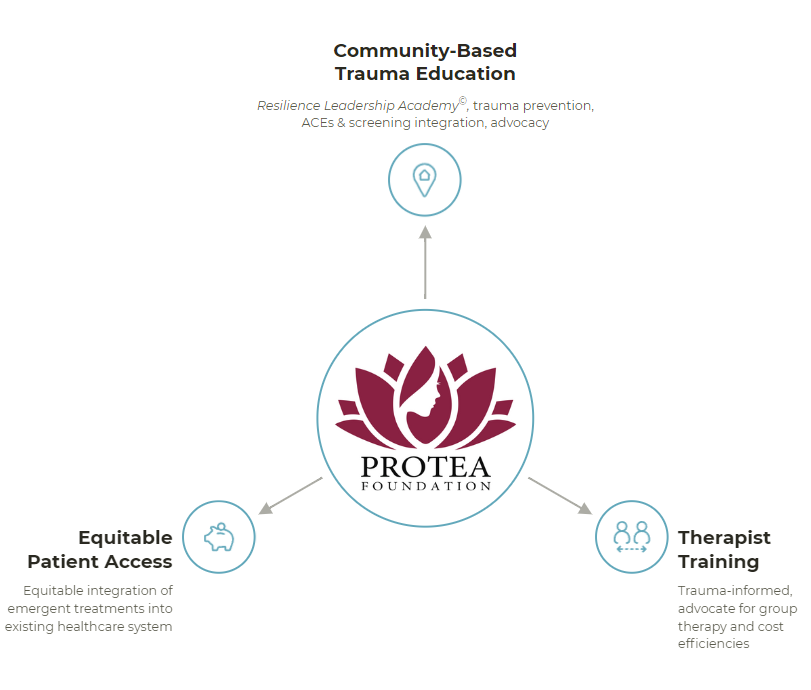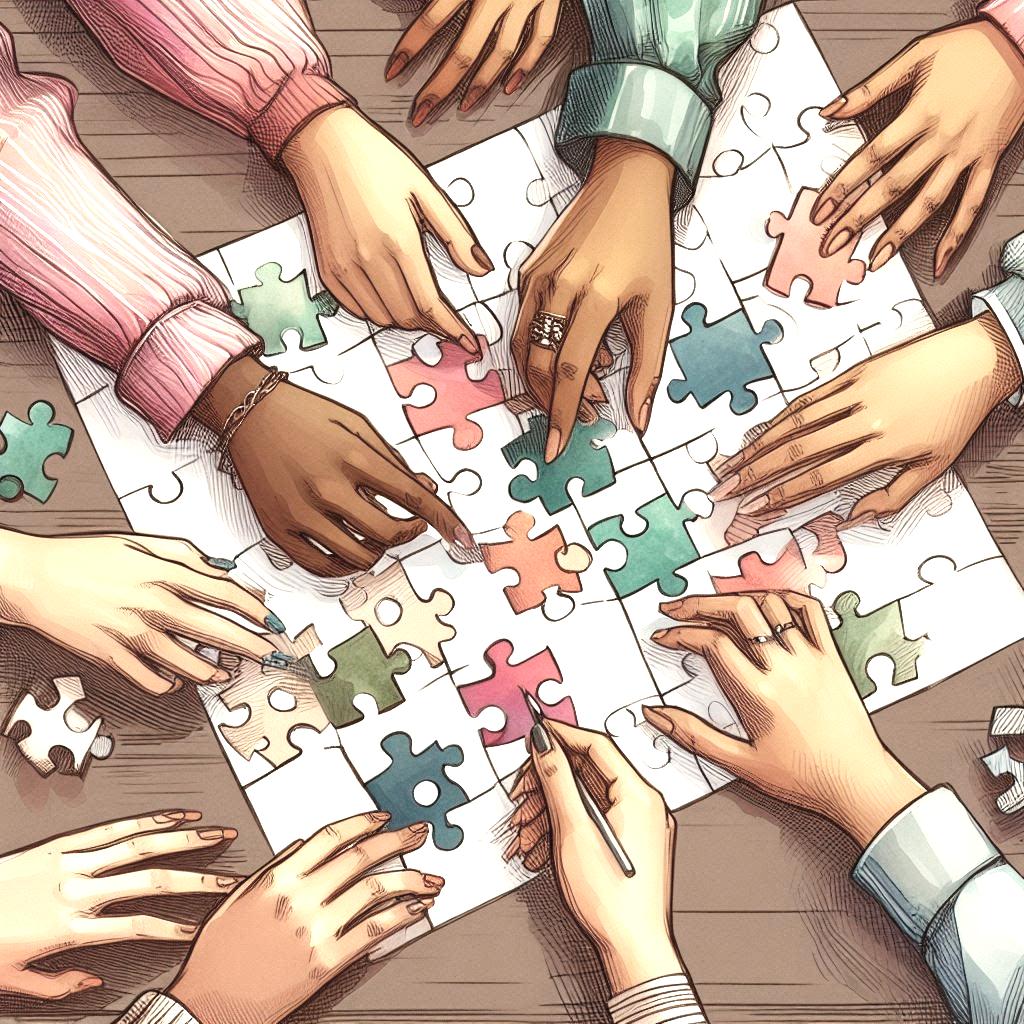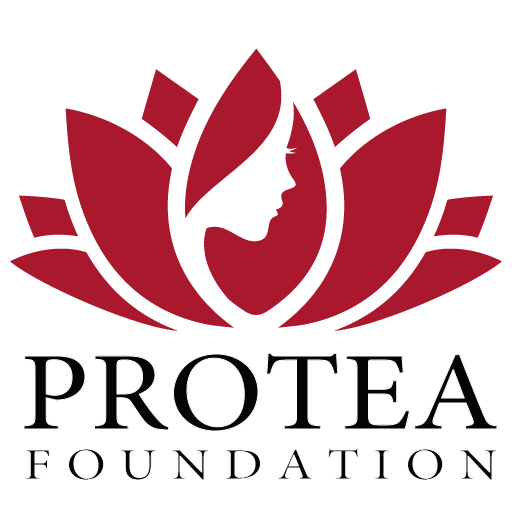Our Mission
Protea Foundation, a 501(c)(3) charitable organization, addresses women’s trauma recovery. Our goal is to restore trauma survivors to their full potential, using leading-edge, effective methods. We focus on women with developmental trauma.
Our initiatives involve funding therapist training, expanding client access to therapies, and promoting resilience through community education and outreach.
NOTE: As a section 170 charitable organization, we are focused on women’s trauma recovery. While the psychedelic therapies currently under consideration by the FDA show incredible promise, we are first and foremost committed to serving a population that is often excluded from effective diagnosis and treatment. Thus, our mission has three parts. (1) Help women (and affected populations) obtain access to best-in-class treatments for trauma recovery; (2) Expand the availability of trauma-informed therapists and counselors including psychedelic-assisted therapies (when legalized), and; (3) Spread awareness of trauma and its impact on community, with a priority for education related to resilience-building skills and trauma prevention.

Mental Health for Women
Women are more likely to experience depression, anxiety, and eating disorders compared to men [National Institute of Mental Health (NIMH)].
Untreated mental health issues can negatively affect a woman’s relationships, self-esteem, work performance, and even physical health [Johns Hopkins Medicine]. There can be links between mental health and conditions like heart disease [Johns Hopkins Medicine].
Access to Treatment
- Stigma and societal expectations: Women often face societal pressure to be strong and nurturing, and seeking help for mental health can be seen as a sign of weakness. This stigma can prevent women from talking openly about their struggles or seeking treatment [Northwell Health].
- Gender bias in diagnosis: Mental health conditions may present differently in women than in men. For instance, depression in women can manifest with more anxiety and fatigue compared to men. This can lead to misdiagnosis or delayed diagnosis [The Seattle Times].
- Healthcare access and affordability: Women, particularly those who are caregivers or living in poverty, may struggle to afford treatment or find childcare and time off work to attend appointments [McLean Hospital].
- Lack of gender-specific treatment: Treatment approaches haven’t always considered the hormonal and biological factors that can influence mental health in women. This can lead to therapies that are less effective for women [McLean Hospital].
Trauma & Resilience
- Improved mental health: Trauma can lead to a range of mental health conditions like PTSD, anxiety, and depression. Treatment helps women process the traumatic event, reduce symptoms, and improve their overall mental well-being [National Center for PTSD].
- Reduced physical health risks: Studies show a link between untreated trauma and physical health problems such as heart disease, chronic pain, and weakened immune systems [Harvard University]. Treating trauma can have a positive impact on a woman’s physical health.
- Healthier relationships: Trauma can negatively affect a woman’s ability to trust and connect with others. Treatment can equip her with skills to build and maintain healthy relationships [National Center for PTSD].
- Empowerment and self-esteem: Trauma can leave women feeling helpless and ashamed. Through processing the experience and developing coping mechanisms, treatment can empower women and improve their self-esteem [Substance Abuse and Mental Health Services Administration (SAMHSA)].
- Reduced risk of substance abuse: Women who have experienced trauma are more likely to turn to drugs or alcohol to cope. Treating trauma can help them find healthier ways to manage difficult emotions [National Center for PTSD].
There’s also the social and economic impact. When women are mentally and physically healthy, they can participate more fully in work, family life, and their communities.
Psychedelic Therapy Treatment and Training
- Rapid and Lasting Effects: Unlike traditional medications that often take weeks or months to show significant improvement, psychedelic therapy can produce rapid and sometimes long-lasting positive effects. Studies suggest these effects can persist for weeks or even months after a single session [1, 2].
- Addressing the Root Cause: Traditional medications often manage symptoms but may not address the underlying causes of mental health issues. Psychedelic therapy, in conjunction with psychotherapy, might facilitate a deeper exploration of emotional issues and lead to a shift in perspective and emotional processing [3].
- Novel Mechanism of Action: Psychedelics work differently from traditional medications. They are thought to increase brain connectivity and neuroplasticity, the brain’s ability to form new connections. This may allow for the formation of new coping mechanisms and a restructuring of thought patterns [2].
- Treatment-Resistant Conditions: Psychedelic therapy shows promise for conditions that haven’t responded well to traditional treatments, such as treatment-resistant depression, PTSD, and anxiety disorders [1].

Helping Women All Over the World
- The World Mental Health Survey Consortium: This study (https://pubmed.ncbi.nlm.nih.gov/26511595/) found that over 70% of respondents globally reported experiencing at least one traumatic event in their lifetime. Women are more likely to experience interpersonal violence, a significant trauma source.
- Women who are sexually assaulted in childhood suffer from PTSD at a rate of 90%. Sexual assault carries one of the highest risks for developing PTSD.
- Women who experience trauma are twice as likely as men to develop PTSD. Here’s why (link to article).
- Childhood socioeconomic status (SES) is closely related to trauma experiences during childhood.

We’re raising money for women who need help
Throughout their lives, approximately 1 in 3 women—equivalent to 736 million globally—endure violence. This violence often begins early. Women face a 2 to 3 times higher risk of developing post-traumatic stress disorder (PTSD) compared to men. The root of this disparity lies in inadequate access to resources and opportunities for women to mitigate the negative effects of trauma. The Protea Foundation empowers communities by teaching accurate identification and facilitating access to effective treatments for PTSD and Complex PTSD. By focusing on women who experienced childhood trauma, we can break the cycle of intergenerational trauma.
How You Can Get Involved
Call (341) 202-7873 to Donate Now Or Contact Us to Get Involved
Volunteer Program
Learn how to plant the seeds of trauma prevention and resilience in your community.
Sponsor Program
Financially support efforts that plant the seeds of trauma prevention and resilience in your community.
Host a Fundraising Event
Send for a Protea Foundation fundraising event kit. Learn how to plant the seeds of trauma prevention and resilience in your community by hosting a fun event for like-minded people!
Get in Touch. Get Involved.
You are a vital part of your community. Stand up for women’s mental health today. Trauma prevention and resilience starts with one action by one individual in one community.
